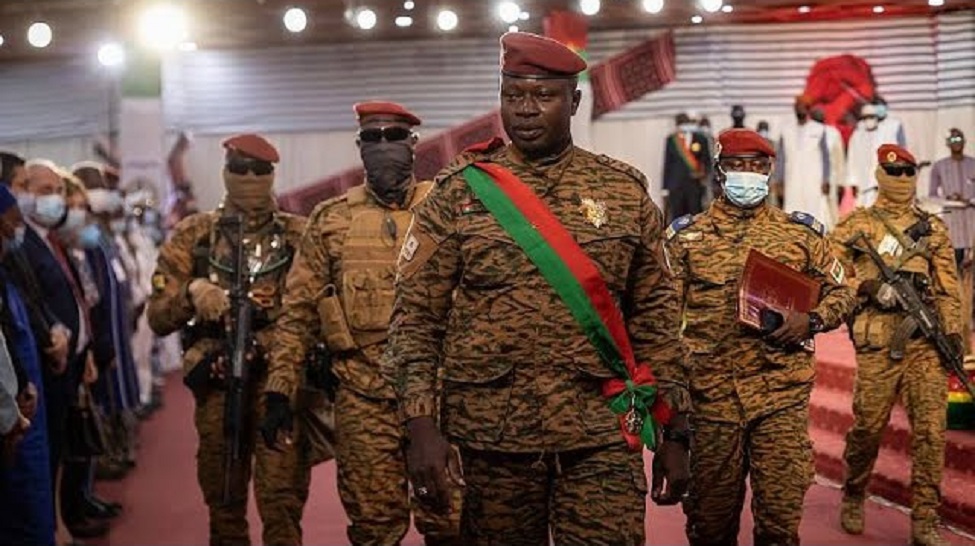Troops are still guarding the National Television Center after Burkina Faso’s second coup this year
Ouagadougou (AFP) – The African Union on Saturday condemned the “unconstitutional change of government” in Burkina Faso, a day after the second coup this year in the poverty-stricken and volatile West African country.
Junior officers ousted the junta’s leader on Friday, saying it had failed to combat jihadist attacks in the country.
“The Chairperson of the Commission calls on the military to immediately and completely refrain from any acts of violence or threats to the civilian population, civil liberties and human rights,” and called for the restoration of constitutional order by July 2024, the African Union said in a statement.
African Union President Moussa Faki Mahamat said he is deeply concerned about the re-emergence of unconstitutional disputes in the West African country and elsewhere on the continent.
In Burkina Faso’s capital, Ouagadougou, an uneasy calm prevailed as soldiers in armored vehicles and pickup trucks guarded the national television center but traffic slowly resumed on main roads.
Shops are slowly opening up in the dusty, scattered city, as Friday’s pre-dawn shooting around the presidential palace culminated in the latest coup that was widely condemned.
The ECOWAS regional bloc condemned “in the strongest possible terms” the recent seizure of power, calling it “inappropriate” at a time when progress was being made towards a return to constitutional order by July 1, 2024.
France, the former colonizer of Burkina Faso, has asked its citizens in Ouagadougou, who are believed to number between 4,000 and 5,000, to stay at home, while the European Union has expressed “concern” over the current events.
The United States called for “the return of calm and restraint by all actors.”
Just before 8:00 pm (2000 GMT) on Friday, more than a dozen soldiers in uniform appeared on state television and radio to announce the dismissal of Lieutenant Colonel Paul Henry Sandaugo Damiba.
They announced that Captain Ibrahim Traore, 34, is in charge.
Damiba came to power in a coup in January after the ousting of Burkina Faso’s elected president
“We have decided to assume our responsibilities, driven by one ideal: to restore security and the integrity of our territory,” they said.
“Damiba failed. Since he came to power, areas that were once peaceful have been attacked. “He took power but then betrayed us,” Habibata Rwamba, a trader and activist, said on Saturday.
With much of the Sahel fighting a growing Islamist insurgency, the violence has led to a series of coups in Mali, Guinea and Chad since 2020.
In January, Damiba declared himself leader of the country of 16 million people after President-elect Roch Marc accused Christian Kabore of failing to defeat the jihadists.
– Damiba accused of failure –
But with more than 40 percent of the country outside government control, leaders of the latest coup said Damiba, too, has failed.
“Far from liberating the occupied territories, the areas that were once peaceful are now under the control of terrorists,” the new military leaders said.
Then they suspended the constitution, closed borders, dissolved the transitional government and the Legislative Council, and imposed a curfew from 9:00 pm until 5:00 am.
The new strongman Traore was the head of the anti-jihadist special forces unit “Cobra” in the northern region of Kaya.
– The fate of the junta leader is unclear –
Dameba’s fate is still unknown.
Soldiers patrolling the streets of Ouagadougou after hearing gunshots in the morning
In the morning, gunshots erupted in the Awaga 2000 neighborhood, which houses the presidential and military council headquarters.
State television was cut off for several hours before the military announcement, broadcasting only a blank screen with the message “No video signal.”
Although Damiba promised to make security his priority when he took charge on January 24, violent attacks have increased since March.
Map of Burkina Faso that locates the city of Djibo
To the north and east, rebels surrounded towns, blew up bridges, and attacked supply convoys.
As in neighboring countries, rebels linked to al-Qaeda and the Islamic State have sparked unrest.
Thousands have been killed and nearly two million people displaced by the fighting since 2015 when the rebellion spread to Burkina Faso, which has since become the epicenter of violence in the Sahel region.
In September, a particularly bloody month, Damiba fired his defense minister and took the job himself.
Earlier this week, suspected jihadists attacked a convoy carrying supplies to the northern city of Djibo. The government said 11 soldiers were killed and about 50 civilians missing.













































